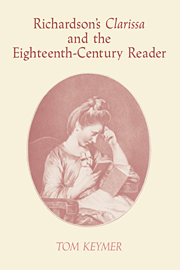Book contents
3 - The part of the serpent The second instalment, April 1748
Published online by Cambridge University Press: 24 October 2009
Summary
Lovelace the principal Male Character in the Celebrated Romance of Clarissa is evidently a Copy of Rowe's Lothario in the fair Penitent this D.r Johnsons owns But adds ‘that the Imitator has excell'd his original in the Moral Effect of this Fiction Lothario w.th gaiety which cannot be hated & Bravery which cannot be Despised retains too much of the Reader's Kindness, it was in the Power of Richardson alone to teach us at once Esteem & Detestation.’ But D.r Beattie another formidable Critic & the friend of D.r Johnson is of a very different Opinion.
‘Richardson's Lovelace says he whom the Reader ought to abominate for his Crimes is adorned wr youth Beauty Eloquence Wit & every intellectual & bodily accomplishment, is there not then reason to apprehend that some Readers will be more inclined to admire the gay profligate than to fear his Punishment’ – so contentious a Science is criticism & so little reference have the opinions of the Learned in Matters of Taste to any common Standard. –
MS note in Clarissa, 4th edn (1759), British LibraryRepresentation and disruption: two controversies
Richardson's sense of the intricacy of social relations was not always so acute as in Clariss's first instalment. His earliest known book, The Apprentice's Vade Mecum, is a straightforward and rigorous conduct manual, dealing not with the familial relations that were to preoccupy him as novelist but with a social category of pressing importance to his activities as Citizen and Master Printer.
- Type
- Chapter
- Information
- Richardson's 'Clarissa' and the Eighteenth-Century Reader , pp. 142 - 198Publisher: Cambridge University PressPrint publication year: 1992



